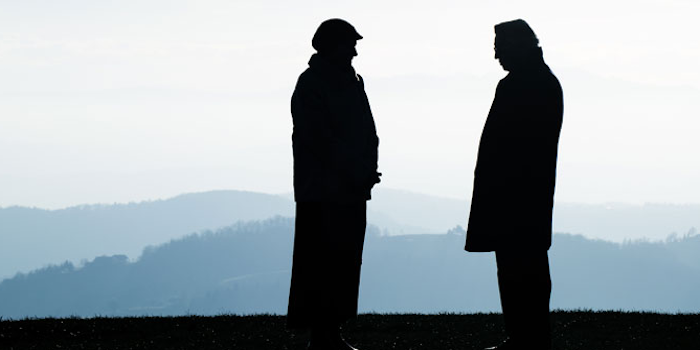
I am your brother Joseph, the one you sold into Egypt. . . .
Then he threw his arms around his brother Benjamin and wept.
Genesis 45.4,14
When sincere confession meets deep forgiveness, amazing things can happen. Consider one, truly amazing case. The case of Judah.
Judah was not a righteous man. We know about Judah from the story of Joseph. Jacob had fallen deeply in love with Rachel, who gives him two sons, Joseph first, and then she dies giving brith to Benjamin. Jacob is devastated. There are other children but firstborn Joseph is his favorite followed closely by Benjamin, two precious links to the departed Rachel. Jacob puts the two boys ahead of ten other brothers.
The brothers hate it. Judah leads them into a plot against Joseph. First they try to murder Joseph but then they sell him as a slave into Egypt. The plot backfires. Jacob clings even more tightly to Benjamin than to Joseph.
So we see that Judah is not a nice person. He is jealous, murderous, and cruel. Not someone you can trust with your life or perhaps with anything. But God has more in ahead for Judah.
It begins with tragedy. Judah’s firstborn son marries Tamar but he dies. His second-born son marries Tamar and also dies. Unwilling to risk another son to marriage with her, Judah abandons Tamar to widowhood. She’s damaged goods. No one will have her. He casts her out of the family.
In desperation, Tamar poses as a prostitute and tempts Judah to sleep with her. He does not recognize her and succumbs to her lure. Soon, Tamar is discovered pregnant and dragged to judgment before Judah. Enraged at what he sees as another betrayal, Judah condemns her to death.
But . . . . before the sentence can be carried out Tamar produces evidence that proves Judah is the father. His sin has caught up with him. Everyone watches to see what he will do.
Perhaps his sin against Joseph had weighed on him heavily. We don’t know, but we do learn that Judah’s hard shell finally cracks. With profound repentance he confesses before everyone, “She is more righteous than I.” His is the very first person in the Bible to confess a sin, and that decision confess rather than deny will change his life forever.
Fast forward many years. By God’s grace Joseph not only survives but thrives in Egypt, becoming powerful, second only to Pharaoh himself.
Jacob, is now an old man with his family threatened with death from famine. He sends his sons to Egypt to buy grain. But he doesn’t send Benjamin. Benjamin, Joseph’s brother and Rachel’s child, is too dear to him to risk on such a trip. The brothers leave for Egypt while Benjamin stays with his father.
Once again, Judah encounters someone he fails to recognize. Joseph, prospered by God and now the most powerful man in Egypt after Pharaoh sells them grain, but he also puts them to a test. He requires them to leave their brother Simeon as a hostage in Egypt. The others are to go home and to return with Benjamin. If they come back with Benjamin, Simeon will be released. If not he will die in Egypt as a slave.
The test is perfectly designed. Earlier they betrayed Joseph. Now they have an opportunity to betray Simeon. They can return home and tell Jacob that Simeon died in Egypt. Joseph wants to learn what they will do.
But this time the brothers, perhaps led still by Judah, do not commit a crime and cover up. They tell Jacob the truth. To rescue Simeon they must return to Egypt with Benjamin. Jacob will have nothing of that. He’s lost Rachel. He’s lost Joseph. Now he’s lost Simeon, and he is not going to risk losing Benjamin. But the famine is relentless. It’s return to Egypt with Benjamin or starve to death.
Judah’s experience of sin and confession has changed him deeply. “Send the boy with me,” he says to Jacob, “and I will personally guarantee his safety. If I don’t bring him back to you, let me bear the blame forever” (Genesis 43:29). Jacob relents and Benjamin and his brothers return to Egypt.
They meet with Joseph again, still not recognizing him. Simeon is released from prison, but Joseph, still not satisfied, sets a final, much deeper test. Benjamin is made to look guilty of a serious theft, and Joseph announces to the brothers that he will keep Benjamin in Egypt as a slave. The others can return home.
What happens next is the most noble and courageous moment in Judah’s life. He decides that he will not betray his brother Benjamin. He will not inflict more pain on his father.
I cannot go back to our father without the boy. Our father’s life is bound up in the boy’s life. If he sees that the boy is not with us he will die. . . . Sp please, my Lord, let me remain here as a slave instead of the boy, and let the boy return with his brothers (Genesis 44:30,39).
Before, Judah sold his brother Joseph into Egytian slavery to gain his father’s love. Now he now offers himself as an Egyptian slave to save his father’s love–and his brother Benjamin.
“Joseph could stand it no longer. He broke down and wept” (Gen 45:1). Casting away the past, and abandoning his suspicions, he gives himself fully to his brothers in love. “I am your brother Joseph, whom you sold into slavery in Egypt. It was God who sent me here, no you!” (45:8).
Confession meets with forgiveness as Judah, the first person in the Bible to confess a sin, is reconciled to Joseph, the first person in the Bible to forgive a sin.
It is very significant that these elements come together in the context of an exchange where one life is offered for another. Judah, guilty of a terrible sin against Joseph, surrenders his life to Joseph. Joseph, with the grace of forgiveness sets him free. This joining of confession with forgiveness is God’s pattern for reconciliation of the world.
Amazing things happen when confession meets forgiveness. I’ll close by mentioning only two, but they are big.
Jacob’s first son was not Joseph by Rachel but Reuben by Leah. Reuben, as the first born of his father, had legal claim to lead to be leader of the family, but Judah was the real leader of the family. He had led them into sin, and now he has led in rescuing them from sin. To this day Jacob’s descendants all over the world identify themselves as “Jehudim” — in English as “Jews”–and that is an identity derived from the name and life of Judah.
And then one more, even larger thing.
Although Judah had sinned with and against Tamar, Judah’s family line was preserved through Tamar who bore his child, Perez. The book of Ruth records this.
Then the elders of the all the people at the gate said [to Boaz], “We are witnesses. May the Lord make the woman [Ruth] who is coming into your home like Rachel and Leah, who together built up the family of Israel. May you have standing in Ephratah and be famous in Bethlehem. Through the offspring the Lord gives you by this young woman, may your family be like that of Perez whom Tamar bore to Judah (Ruth 4:11-12).
The prayer of the elders has been fulfilled far more richly than they would ever know as God wove a tapestry of threads stretching over 1,500 years.
Rachel, we saw was the mother of Joseph. And Judah? Well, his mother was Leah. And Ruth did indeed build a family.
Matthew 1:5-6 completes the story. Ruth gave birth to Obed; Obed to Jesse, and Jesse to King David. To David, God promised an eternal kingdom, and Jesus, the Eternal King was born in Bethlehem famous in the region of Judea. His mother was Mary. His father was named (don’t miss it, now!) Joseph, a descendent of Perez, son of Tamar from Judah who sold his brother Joseph into slavery but learned to confess and to receive forgiveness.
When confession meets forgiveness, salvation flows down through history, around the world, and on into eternity.
